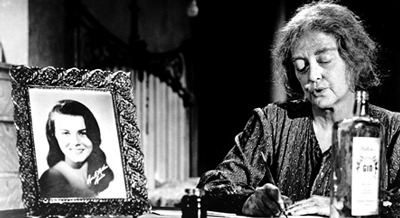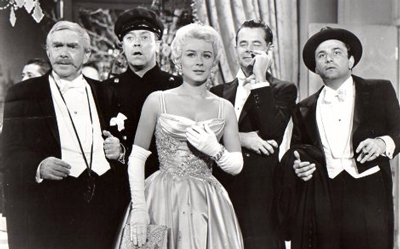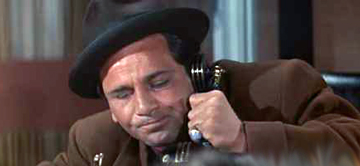
 |
|
|
|
Frank Capra's motto was "One man, one movie", which sounds okay until one realizes that Robert Riskin was an equal creative contributor on some of Capra's best-known hits of the 1930s. If Capra was speaking about filmmaking authority, he could make that claim only because Harry Cohn let him have most of what he wanted. Capra's career really ended with the war. He made a great picture as a post-Columbia independent but got clobbered in the business end of things and from then on floundered in remakes. Back on his feet coming into the Kennedy decade, Capra tried to make a go of it with two big United Artists releases, but once again found the system discouraging. His kind of movies needed big stars and by 1960 big stars had more control over their movies. Capra's last two films show his 'Capracorn' magic coming through only intermittently. A Hole in the Head works best when Frank Sinatra is front and center, playing off a little kid. 1961's Pocketful of Miracles is a Piñata Movie...it's old-fashioned, it splatters all over the place, and many of the individual pieces inside are really good. Capra and Riskin's 1933 comedy Lady for a Day is one of his best pictures - smart, honestly sentimental and free of the director's later tendency to preach. It's a pure Damon Runyon fairytale of the Manhattan sidewalks, the Guys 'n' Dolls playground where hustlers, showgirls and street hawkers mingle with high rollers and the nightclub set. Runyon's characters had their own way of speaking. The newsvendors and panhandlers remind us of the clans in The Beggar's Opera or its descendant The Threepenny Opera. Lady for a Day is a Cinderella story of the downtown gutters. Seen another way, it's the fantasy opposite of the mother love soap opera Stella Dallas: a poor, socially unacceptable mother is estranged from her daughter. Instead of suffering a social doom, the entire benevolent underworld comes to her aid. 
The Panavision and Color remake Pocketful of Miracles takes almost the same exact story, lengthens it by half and gives more fanciful characters more business to do, at a slower pace. Prohibition is over, and colorful bootlegger Dave the Dude (Glenn Ford) is at a major career crossroads. Already established as the criminal King of New York, he will either enter a partnership with the big Chicago mob chief Steve Darcy (Sheldon Leonard), or if another hood is chosen, probably get rubbed out. Dave's lieutenant Joy Boy (Peter Falk) is having fits because the Dude is too wrapped up in personal problems to meet with the impatient Darcy. Dave owns a nightclub with his steady girl Queenie Martin (Hope Lange), but it has been shuttered right along with his booze racket, and she wants him to settle down to a non-mob marriage. The superstitious Dave is more concerned that he won't be able to get one of his 'lucky' apples from the frumpy street vendor Apple Annie (Bette Davis), which he believes he must have when he meets Steve Darcy. To solve his problem, Dave must first solve Annie's: she's been supporting a daughter in Spain, who thinks that her mother is wealthy and lives in a fine hotel. The daughter Louise (Ann-Margret in her first movie) has become engaged to nobility, and wants to bring her fiance Carlos (Peter Mann) and his father Count Alfonso (Arthur O'Connell) to New York so they can formally ask for her hand in marriage. Dave the Dude must marshal the entire underworld to pull off the illusion that Apple Annie is a dowager millionaire. Pocketful of Miracles will delight fans of 1930s movies, because it was made by a director whose world view is still back in that era. Capra handles the delicate, fanciful story well enough but its sheer length frequently bogs it down. Co-producer Glenn Ford cuts a fine figure as Damon Runyon's outdated 'good gangster', somehow making Dave the Dude both a tough guy and a creampuff when it comes to his personal sentiments and superstitions. Our dapper hero's ambition is to control all vice rackets in NYC. People talk about bodies ending up in the river, but it's only talk. Nothing that serious frays the fabric of this sweetness 'n' light fable. This is the only movie in which Bette Davis gets lost in the crowd of talent. Less than halfway in, her ragged street vendor is transformed into a great lady, and from then on stays that way. Where before was a flip of dirty hair and a greasy freckled face, is now a dowager who looks and speaks like Queen Elizabeth. Davis stays in waxworks mode until the obligatory cry-for-happy conclusion. By that time everybody in this low-stress comedy is so chummy, we almost forget to cry. Ann-Margret is a minor player in the charade, and we doesn't contribute much beyond her winning smile. Capra just can't afford another fleshed-out character. 
But there's plenty fun to be had with the film's ensemble players, of which there are so many that half are unbilled. It's as if Capra handed out roles to every character actor from the '30s and '40s still breathing. All are cast to type. The director handles his gaggle of street beggars (Ellen Corby, Edgar Stehli, Angelo Rossitto) in the same way he did the 'little people' in his populist pix. A chorus of little star-worshipers, they share a single personality and are content to be ignored and irrelevant. Gangsters, cops, civic-minded gents and powerful politicians come not singly but in groups. With so many pro actors on deck and given so much individualized business, the movie stre-etches out before our eyes even as we admire the parade of recognizable faces. It's a quiz movie for actor-spotters. Mickey Shaughnessy has a fat part as a bumbling chauffeur, but both Jack Elam and Mike Mazurki get little bits. Hey look, good old Barton MacLane is still alive and kicking... Capra and Ford had their power plays and casting battles -- Shirley Jones was told that she had the Queenie Martin part, but Glenn Ford insisted that it be given to his girl friend Hope Lange. All the major roles are perfectly cast. Edward Everett Horton's face had by this time shriveled into one big wrinkle, but his comedy timing is still as sharp as a razor. Arthur O'Connell makes a surprisingly effective Spaniard and Thomas Mitchell is as good as ever. The big surprise is Peter Falk as Dave's worrywart assistant bootlegger. A hot dramatic actor after his hit Murder Inc., Falk steals the movie with his comic asides and sarcastic comeback. Without Peter Falk, Glenn Ford wouldn't be funny, and probably wouldn't convince as a gangster. From this point on Falk would alternate between serious dramas and knockabout comedies. The comedy of 1961 that orchestrates real old-fashioned manic energy is Billy Wilder's corny/witty One, Two, Three. Pocketful of Miracles' does have its good moments. A Glenn Ford & Hope Lange difference of opinion becomes a fight where he rips her clothes and she demolishes a bedroom. Ford's face-off with Sheldon Leonard's mobster is so nicely done that it keeps the gangland threat at least a little bit on our minds. 
The movie bears signs of re-editing, or maybe reshooting. Was the beginning longer? A prologue shows Dave and Queenie meeting in the ruins of her murdered father's speakeasy. She's a mousy, virtuous pauper meekly vowing to pay off daddy's debts. Across a fade out and fade up, it's suddenly a year or two later. Queenie is now a Texas Guinan-style jazzy entertainer, acting as if she were born on a burlesque stage. No explanation given. Another scene ends abruptly mid-dialogue with a rude cut to black. A third scene in the back of Dave's car shows him suddenly meaner, almost with a different character than he had before or after. His dialogue is an exposition dump of the film's various conflicts up to that time. Did Glenn Ford become concerned that the story needed clarification? The movie performed few miracles for its famed talent, with star and director maybe engaged in an ego war. Frank Capra's autobiography is riddled with questionable accoounts; he blames Glenn Ford for interfering with his direction, putting the actors at each other's throats and giving him debilitating migraine headaches. Capra said the movie was 'miserable' but also called it an improvement on Lady for a Day. The Ford version of events, as related in a book by his son Peter Ford, insists that Capra had unreasonable objections to the actor-producer's rightful 'influence over the decision making.' Biographer-critic Joseph McBride's painstakingly researched version of events paints Capra as unable to put the show together by himself and too belligerent to attract quality collaborators. McBride says that Capra's own updated version of the script included new elements, like Korean War orphans and Cold War arguments. Various biographies noted that Glenn Ford was pleased to hire Bette Davis, as she had been good to him when he was getting his career underway. The outspoken Ms. Davis expressed her fury when Ford made public statements congratulating himself for his generosity, implying that Davis was a has-been. Pocketful of Miracles wasn't a big hit. But despite being nobody's idea of a classic, it's colorful and has plenty of funny jokes to go with its impressive cast. With so many familiar actors wandering in and out, it also carries a potent nostalgia factor -- many are notable from earlier Capra hits, like Ellen Corby, or Thomas Mitchell who died just a year later. |
|||||||||||||||||||
Review Staff | About DVD Talk | Newsletter Subscribe | Join DVD Talk Forum
Copyright © MH Sub I, LLC dba Internet Brands. | Privacy Policy
Subscribe to DVDTalk's Newsletters
|